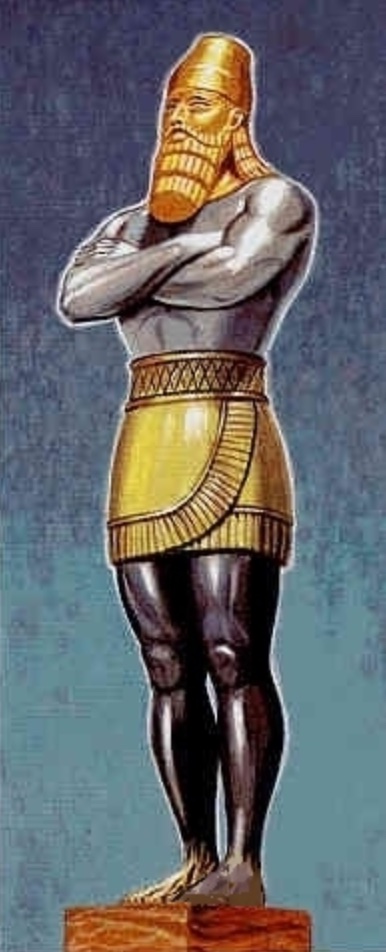|
|
Daniel Chapter 3 Answers
Day One

1. What is it about chapter three that seems to be derived from chapter two? Is there a possible connection? If so, what might that be?
It seems that King Nebuchadnezzar probably got his idea of the statue from his dream.1 Notice that there is nothing but gold for this statue, no silver, bronze, iron, nor any clay. Daniel explained the gold head represented him. So, he just makes the whole statue of gold. No, none of those inferior kingdoms are represented in this statue. There are no inferior metals in this statue, just the dazzling gold.
But why didn’t he remember the statue would be destroyed and amount to nothing? I guess he could have just built a great mountain — but not one that Daniel explained filled the whole earth.
Maybe for a moment when Shadrach, Meshach, and Abednego saw the great statue, maybe as they were looking at this dazzling colossal statue before them, perhaps before the herald announced why it was there, for a moment they may have thought — here now the king will surely tell everybody about the dream he had and about the great God of Daniel who had interpreted the dream and what the future held for the world.
2. The king doesn’t mention God at all when everybody is gathered to see the statue.
In chapter two the king didn’t worship God when his dream was revealed, instead he worships Daniel. And here in chapter three nobody is worshipping God.
But what is it specifically about the worship the king calls for in chapter three that seems inauthentic, that seems illegitimate? What’s wrong with it?
- First, the worship is commanded by someone in authority over the people - the king. Basically they are told what or whom to worship.
- The second thing wrong is that the worship is enforced by punishment.
- Third, the worship is orchestrated (literally) and they are told when to worship.
- Fourth, they are told how to worship - you will bow, face down.
Contrarily, we worship God because we choose to do so, no-one needs to threaten us.
There is no genuine worship if someone is commanded to worship, told when and how to do so, and threatened with their lives if they don’t do so.
Day Two

1. Who is it that’s missing in chapter three, and why might this be surprising?
The word Daniel or any intimation of him is absent from chapter three.
This is surprising because in verse 48 of chapter two, the king made Daniel “ruler over the entire province of Babylon”. Yet, when the king sends word that “all the rulers of the provinces are to attend the dedication of the statue” in verse 2 of chapter three, Daniel is not mentioned. Yet he is the ruler of the Babylonian province, and that’s where the colossal statue was built — in the province he ruled (vs 1). It’s unlikely he wasn’t aware of it. But it’s surprising that he’s not mentioned.
It doesn’t mean he wasn’t there, it simply isn’t stated. The main character shows up though — God Almighty is the main character.
2. Based on what you’ve learned about Daniel, is it possible that he simply bowed and worshipped the statue? Why or why not?
No way — he wouldn’t even eat the king’s food in chapter one because it would have defiled him. It’s therefore very unlikely he bowed to worship a foreign pagan god.
3. What are the three accusations of the Chaldeans bring against Shadrach, Meshach, and Abednego?
From verse 12:
- They have ignored you
- They do not worship your god
- They do not worship the gold statue you have set up
Day Three
1. In verse 15, the king asks Shadrach, Meshach, and Abednego “who is the god who will rescue from my power?”, but they don’t actually answer his question.
Instead, they offer the king two conditional statements. What are these two statements? Specifically, what are the “if” and “then” components?
Statement #1:
IF — the God we serve exists THEN — he can rescue us from:
1) the furnace of blazing fire
2) the power of you the king
Statement #2:
IF — he does NOT rescue us THEN — we want you to know that we will not:
1) serve your gods
2) worship the gold statue you set up
2. So what are Shadraach, Meshach, and Abednego saying about their God? Also, what does their explanation to the king say about their faith in their God?
They are saying (to the king’s face) that their God is more powerful than King Nebuchadnezzar, that he can defeat him or nullify their penalty for disobeying him, and that he can even rescue them from anything he can “cook up”.
Their perspective is remarkable. They understand and explain that even though God may not choose to rescue them — even though he can — they will not worship a false god.
Basically, they value their obedience to their God more than their very lives.
Day Four
1. How long it took them to heat the furnace seven times hotter than normal we aren’t told, but what must Shadrach, Meshach, and Abednego have been doing while this was happening?
They must have been praying based on how they responded to the previous problem of understanding the king’s dream.
2. How might the lives of Shadrach, Meshach, and Abednego been changed by the experience of God rescuing them? How are the lives of modern day Christians like Shadrach, Meshach, and Abednego?
For the rest of their lives, they must have been thankful to God for rescuing them from the fiery furnace.
Today, Christians should also be thankful to God for rescuing them from the flames of hell through the sacrifice of the Lord Jesus Christ.
Day Five

1. Does anything surprise you about this story? Is there anything remarkable in it? What about it seems strange to you?
That the three men stayed in the furnace until the king called them out seems strange, but then again, it must REALLY be pleasant to be with Jesus — and his presence makes everything OK. Heaven must be really nice!
2. Has there been a time in your life when your life was in mortal danger? Can you share about a time in your life when you had no other option but to ask God to save you from imminent danger?
Also, how can this story help missionaries who risk their lives for the sake of the gospel?
Your answer alone suffices for the first question.
As for this story helping missionaries who risk their lives, it would seem to comfort them to remember the example of these three brave men.
Please know that as an Amazon Associate we earn from qualifying purchases linked on this site.
|
1 Miller, Stephen R. 1994. Daniel (The New American Commentary). Vol. 18. Nashville: Broadman & Holman Publishers. |
 |